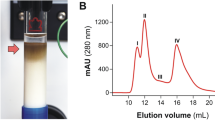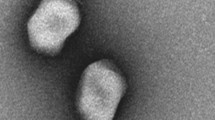Abstract
IN order to examine the inactivation of phages the following Brucella substrates were used: (a) Acetone-killed bacteria of Brucella melitensis strain 16 M, suis 1330 and abortus strain 12, according to Olitzki1; (b) protein, polysaccharide and nucleoprotein fractions of Brucella melitensis strain 16 M obtained by extraction with phenol-water, according to Westphal2.
This is a preview of subscription content, access via your institution
Access options
Subscribe to this journal
Receive 51 print issues and online access
$199.00 per year
only $3.90 per issue
Buy this article
- Purchase on Springer Link
- Instant access to full article PDF
Prices may be subject to local taxes which are calculated during checkout
Similar content being viewed by others
References
Olitzki, A. L., and Sulitzeanu, D., Brit. J. Exp. Path., 39, 219 (1958).
Westphal, O., Lüderitz, O., and Bister, F., Z. Naturforsch., 7b, 148 (1952).
Adams, M., Bakteriofagia (Moscow, 1961).
Końziski, A. W., and Macierewicz, M., Med. Doś. Mikrobiol., 3, 61 (1951).
Brinley-Morgan, W. J., Documentation de I'OMS Brucella, 224 (1962).
Parnas, J., Burdzy, K., Sarneeka, B., Münter, W., and Patorska, E., Zbl. Bakteriol. Orig., 188, 283 (1963).
Author information
Authors and Affiliations
Rights and permissions
About this article
Cite this article
PARNAS, J., TUSZKIEWICZ, M. & ZALICHTA, S. Inactivation of Brucellaphages by Chemical Fractions of Brucella. Nature 206, 320–321 (1965). https://doi.org/10.1038/206320a0
Issue Date:
DOI: https://doi.org/10.1038/206320a0
This article is cited by
-
Inactivation of Brucellaphages on Full-antigen Substrates of Brucella
Nature (1966)
-
The influence of normal and immune sera on the adsorption of Brucellaphages
Zeitschrift für Medizinische Mikrobiologie und Immunologie (1966)
Comments
By submitting a comment you agree to abide by our Terms and Community Guidelines. If you find something abusive or that does not comply with our terms or guidelines please flag it as inappropriate.



